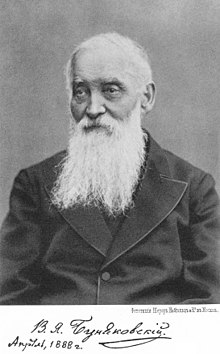Viktor Bunyakovsky
| Viktor Yakovlevich Bunyakovsky | |
|---|---|

Viktor Bunyakovsky in 1888
|
|
| Born | 16 December [O.S. 4 December] 1804 Bar, Podolia Governorate, Russian Empire |
| Died | 12 December [O.S. 30 November] 1889 St. Petersburg, Russian Empire |
| Residence | Russian Empire |
| Fields | Mathematics, Physics, Finances |
| Institutions | St. Petersburg Academy of Sciences |
| Alma mater | École Polytechnique |
| Doctoral advisor | Augustin Cauchy |
| Known for | Cauchy–Schwarz inequality, theoretical mechanics, probability theory, number theory, condensed matter physics, finances |
| Signature | |
Viktor Yakovlevich Bunyakovsky (Russian: Ви́ктор Я́ковлевич Буняко́вский, Ukrainian: Ві́ктор Я́кович Буняко́вський; 16 December [O.S. 4 December] 1804, Bar, Podolia Governorate, Russian Empire – 12 December [O.S. 30 November] 1889, St. Petersburg, Russian Empire) was a Russian mathematician, member and later vice president of the Petersburg Academy of Sciences.
Bunyakovsky was a mathematician, noted for his work in theoretical mechanics and number theory (see: Bunyakovsky conjecture), and is credited with an early discovery of the Cauchy–Schwarz inequality, proving it for the infinite dimensional case in 1859, many years prior to Hermann Schwarz's works on the subject.
Viktor Yakovlevich Bunyakovsky was born in Bar, Podolia Governorate, Russian Empire (today Ukraine) in 1804. Bunyakovsky was a son of Colonel Yakov Vasilievich Bunyakovsky from the Ulansky regiment, who was killed in Finland in 1809.
Bunyakovsky obtained his initial mathematical education at the home of his father's friend, Count Alexander Tormasov, in St. Petersburg. In 1820, he traveled with the count's son to a university in Coburg and subsequently to the Sorbonne in Paris to study mathematics. At the Sorbonne, Bunyakovsky had opportunity to attend lectures from Laplace, Poussin, and Fourier. He focused his study and research on mathematics and physics.
...
Wikipedia
